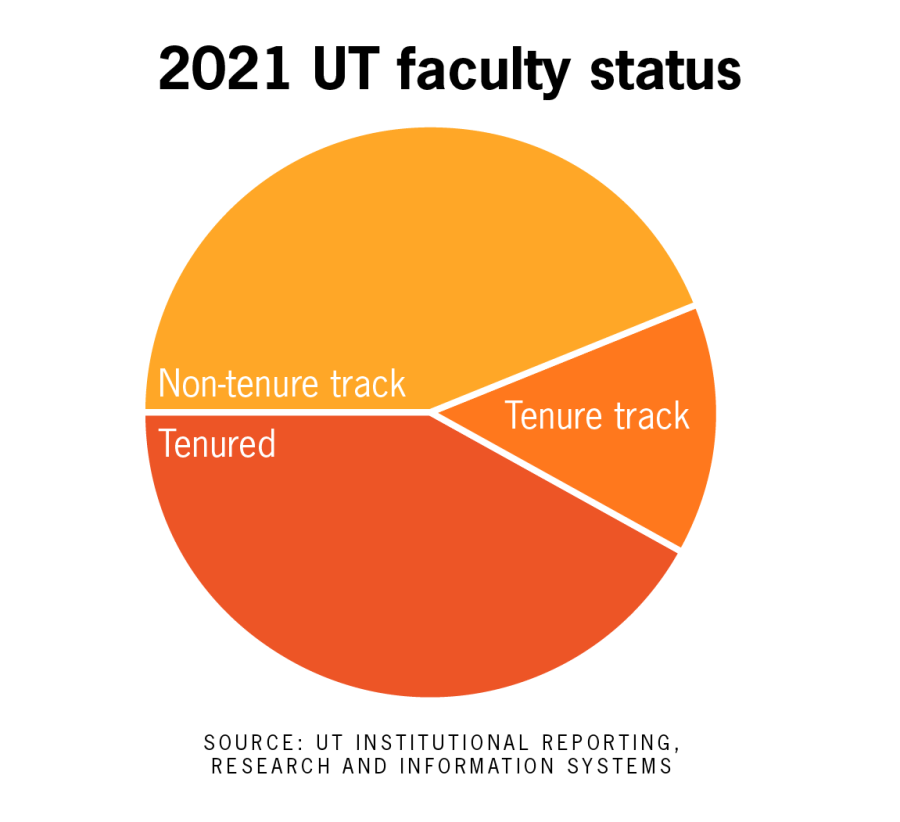Professors fear potential impacts of tenure-ending bill
April 13, 2023
With her elementary, middle and high school all within a three-mile radius of UT, Kima Cargill’s childhood was always influenced by the University’s atmosphere and highly regarded academics. The prestigious university in her backyard felt like the natural choice for her bachelor’s, master’s and doctorate degrees.
Cargill has since established her professional career at the University of Washington’s graduate school, working now as both associate dean of academic affairs and a professor of psychology. Despite the sizable distance and time between herself and her alma mater, she still remembers the UT campus fondly.
When a coworker recently forwarded a UT faculty position to Cargill, she said her answer to possibly returning to the Forty Acres was easy — “Absolutely not.”
Despite her personal connection and the high esteem of the UT’s academia, Cargill said Texas Senate Bill 18, which proposes to end tenure opportunities for new hires at Texas public universities, presents a possibility that the quality of faculty at the state’s institutions could soon decline.
The American Association of University Professors states tenure provides professors with “indefinite employment” and “academic freedom” to complete their research endeavors.
“I’m not going anywhere where they would have tenure even be in question,” said Cargill, co-chair of UW’s faculty affairs committee. “If I were applying for a professor job right now and I had an application at UT, I would just withdraw it. I wouldn’t even go there unless I had no other options.”
After serving on his college’s tenure committee, Ricardo Ainslie, a tenured professor of educational psychology at UT, said academic review during the tenure process ensures the “crème de la crème” receive and maintain tenure.
Although some students may not see the value of tenure, Ainslie said they will certainly feel its absence in their academic and research opportunities in the years following the ban.
“If you have a sense of pride that you’re at UT, then you’re not going to feel the same sense of pride for this university a couple of years after this (ban) happens,” Ainslie said. “You’ll wish you’d gone somewhere else.”
The University’s communications office declined to comment on this story.
UT pharmacy professor Andrea Gore said having tenure allowed her to take risks and new directions in her research. In the 20 years she’s been at the University, she’s generated around $10 million in grant funds and plans to bring in more soon.
Even though her tenure status would remain intact, Gore said she would consider moving to another university if the bill passed. She said the working environment at UT could decline significantly and primarily affect current assistant professors who “came to the University with the promise that they would have the opportunity to go up for tenure.”
“(This bill) isn’t going to allow the kind of continuity and long-term collaboration that makes both teaching and research great,” Gore said. “I’m very conflicted.”
Cargill said universities like her own would likely capitalize on the bill, reaching out to faculty members that would otherwise not consider uprooting their careers.
Cargill said she worries for UT as a whole and the future students who attend her alma mater. She said she is also concerned other states may follow suit in limiting tenure, with Florida already passing a bill meant to make retaining tenure at the state’s public universities harder.
“(Texas) is going to be the first domino to fall,” Cargill said. “I don’t think (lawmakers) understand the severe damage it would do to the entire state of Texas.”



